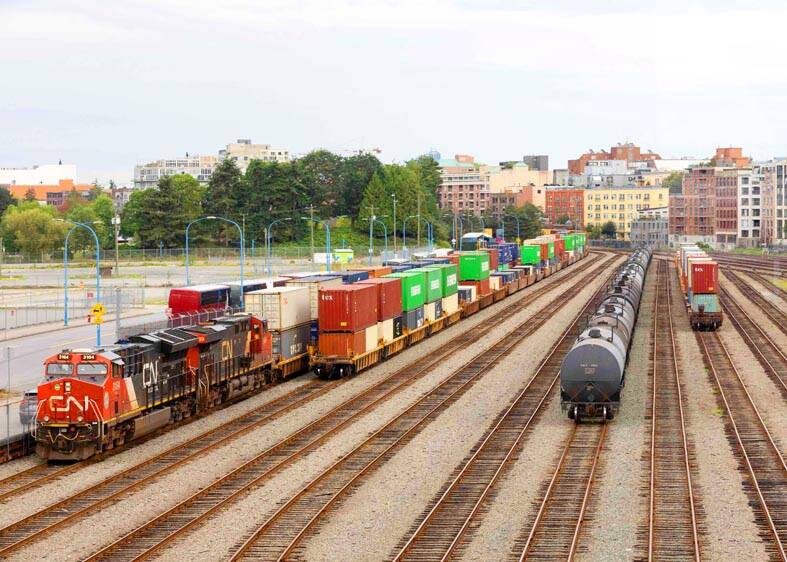Canada’s two biggest railways, accounting for almost 80 percent of the national network, shut down early yesterday after talks with a union failed, immediately blocking arteries of North American supply chains that carry about C$1 billion (US$736.4 million) per day in trade.
More than 9,000 employees at Canadian National Railway Co and Canadian Pacific Kansas City Ltd were locked out after a deadline elapsed early yesterday. The two companies were unable to reach a deal with the Teamsters Canada Rail Conference after the union voted in favor of a strike over scheduling and ways to mitigate worker fatigue.
Canadian National has consistently made offers to improve wages and rest time, including a final offer to avoid a lockout, a spokesperson said in a statement.

Photo: AFP
“The Teamsters have not shown any urgency or desire to reach a deal that is good for employees, the company and the economy,” the spokesperson said.
The main obstacles to reaching an agreement remain the companies’ demands, not union proposals, union president Paul Boucher said.
“Their sole focus is boosting their bottom line, even if it means jeopardizing the entire economy,” Boucher said in a statement.
The union continues to make unrealistic demands that would fundamentally impair the railway’s ability to serve its customers, a Canadian Pacific spokesperson said.
“We fully understand and appreciate what this work stoppage means for Canadians and our economy,” the spokesperson said in a statement.
The stoppage might cost Canada as much as C$341 million per day, a Wednesday estimate from ratings agency Moody’s Corp showed.
As the deadline approached, business groups and rail-dependent industries, from automakers to agriculture, had issued dire warnings about the economic damage, which could mean plants cutting shifts or shuttering, as well as longer-term injury to Canada’s trading relationships and reputation for reliability, following other recent disruptions to its transportation networks.
Shippers had already diverted some cargo to the US ahead of the strike. Certain crucial major Canadian commodities such as fertilizer, grain and lumber need rail to move and cannot be transferred onto trucks at scale. The stoppages would also cause upset for Canadian city commuters.
It is the first time in decades that workers at both companies walked out simultaneously, and the lead-up prompted urgent questions for the federal government.
Canadian Minister of Labor Steven MacKinnon denied Canadian National’s request to impose binding arbitration on Thursday last week and encouraged parties to reach a deal at the bargaining table.
The minister also met with the parties and federal mediators on Tuesday and Wednesday.

Semiconductor business between Taiwan and the US is a “win-win” model for both sides given the high level of complementarity, the government said yesterday responding to tariff threats from US President Donald Trump. Home to the world’s largest contract chipmaker, Taiwan Semiconductor Manufacturing Co (TSMC, 台積電), Taiwan is a key link in the global technology supply chain for companies such as Apple Inc and Nvidia Corp. Trump said on Monday he plans to impose tariffs on imported chips, pharmaceuticals and steel in an effort to get the producers to make them in the US. “Taiwan and the US semiconductor and other technology industries

SMALL AND EFFICIENT: The Chinese AI app’s initial success has spurred worries in the US that its tech giants’ massive AI spending needs re-evaluation, a market strategist said Chinese artificial intelligence (AI) start-up DeepSeek’s (深度求索) eponymous AI assistant rocketed to the top of Apple Inc’s iPhone download charts, stirring doubts in Silicon Valley about the strength of the US’ technological dominance. The app’s underlying AI model is widely seen as competitive with OpenAI and Meta Platforms Inc’s latest. Its claim that it cost much less to train and develop triggered share moves across Asia’s supply chain. Chinese tech firms linked to DeepSeek, such as Iflytek Co (科大訊飛), surged yesterday, while chipmaking tool makers like Advantest Corp slumped on the potential threat to demand for Nvidia Corp’s AI accelerators. US stock

The US Federal Reserve is expected to announce a pause in rate cuts on Wednesday, as policymakers look to continue tackling inflation under close and vocal scrutiny from US President Donald Trump. The Fed cut its key lending rate by a full percentage point in the final four months of last year and indicated it would move more cautiously going forward amid an uptick in inflation away from its long-term target of 2 percent. “I think they will do nothing, and I think they should do nothing,” Federal Reserve Bank of St Louis former president Jim Bullard said. “I think the

SUBSIDIES: The nominee for commerce secretary indicated the Trump administration wants to put its stamp on the plan, but not unravel it entirely US President Donald Trump’s pick to lead the agency in charge of a US$52 billion semiconductor subsidy program declined to give it unqualified support, raising questions about the disbursement of funds to companies like Intel Corp and Taiwan Semiconductor Manufacturing Co (台積電). “I can’t say that I can honor something I haven’t read,” Howard Lutnick, Trump’s nominee for commerce secretary, said of the binding CHIPS and Science Act awards in a confirmation hearing on Wednesday. “To the extent monies have been disbursed, I would commit to rigorously enforcing documents that have been signed by those companies to make sure we get